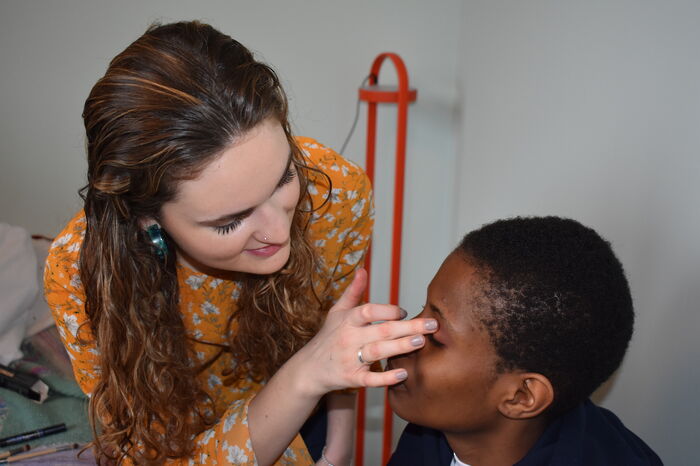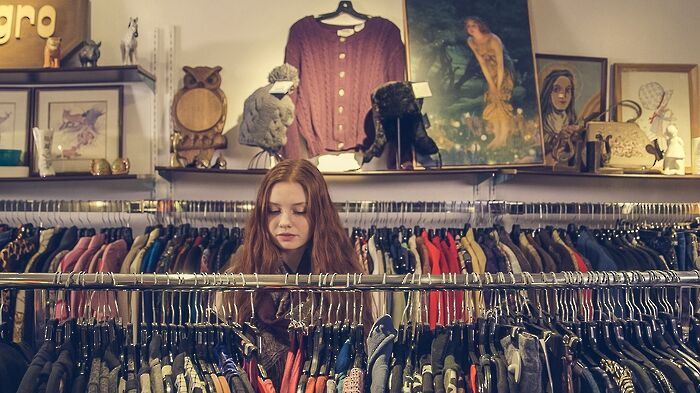Is literature fashion’s muse?
Fashion Editor Caterina Bragoli discusses the importance of literature within fashion, prompted by its feature in Dior’s Fall/Winter 2019 Haute Couture collection
This year, Dior graced our eyes with an overwhelmingly dark, almost gothic collection in their Fall/Winter 2019/20 Haute Couture show. It featured Dior’s classic silhouette of a corseted bodice culminating in a nipped in waistline, and a full, dramatic skirt. The sea of black outfits, presenting lace panels and ombre balloon-skirted dresses, was mystifying to say the least, and was the epitome of Maria Grazia Chiuri’s “Generation Black”.
The opening garment, a flowing Grecian-style cream dress, with “Are Clothes Modern?” emblazoned across the front acted as the sole exception to this running motif. The bewildering question it posed – contested by the conservative hemlines and classic, even old-fashioned, silhouettes – was at the fore of onlookers’ minds when taking in the collection.
“Are Clothes Modern?” is a question which does not find its origins on the design floor of Dior. This question was in fact the title of a popular essay and an accompanying exhibition by the architect Bernard Rudofsky (held at the Museum of Modern Art in Manhattan, 1947). Placing literature and fashion together in a collection marks a bold step from Chirui, who knows how to spread a message to a wide audience as demonstrated in her Spring 2017 “We Should All Be Feminists” collection. We consumers of fashion, in all its forms, are prompted to consider the importance of literature in the industry.
Chiuri comments that she favoured Rudofsky’s essay as “he writes about how fashion is not just about creativity but about all of human life”. This sentiment undeniably rings true in Rudofsky’s essay as he takes us on an evolutionary fashion journey, a journey with striking parallels to the journey Chiuri has taken Dior on: from the feminine to the feminist, giving fashion a human face.
“From the first phase of timid desire for the adoption of a fad, through the sheer religious devotion as demonstrated by the punctilious care for the detail of the fashion, to the sudden boredom and physical horror of an outlived vogue, we have the perfect analogy [...]: craving and devotion for the love object” Rudofsky opens his essay by encapsulating the world of fashion and the feelings that it elicits amongst us all perfectly.
The ‘fad’, or in more modern terms, trend-led fashion culture, is something many of us have experienced. Spotting the same recurring items on the runway or even on the street conjures up an almost insatiable desire to participate, as we’re reeled in by the fashion world. If you're an avid follower of fashion, or you enjoy piecing together outfits according to colour, pattern, or texture, then you will be no stranger to the ‘sheer religious devotion’ an attachment to a garment can trigger within you. I’ve certainly felt overcome by appreciation for pieces in my wardrobe, and I can confirm it’s borderline reverence (perhaps slightly melodramatic but true nonetheless). The ‘physical horror of an outlived vogue’ is a perfect condensement of the disastrous issues of fast fashion: the sad reality of fashion is that it works as if on a timer. Trends are given time spans, and once past sell-by-date, they can often be disposed of, rejected forever as they acclimatise to their new home of landfill sites.
The ‘physical horror of an outlived vogue’ is a perfect condensement of the disastrous issues of fast fashion
Chiuri’s use of literature as a quasi-muse for her collection prompts us to consider how else literature can play a key part in the realm of fashion. Chiuri credits literature as "a reference point in my work", prompting us to consider the links between fashion and literature, two mediums that, whilst being mind-blowing art forms in their own right, initially seem worlds apart. Yet, both writing and clothing embody culture, society and politics (to name but a few factors), the only difference being that fashion materialises in front of us, whereas literature is an imaginative process. The following works are examples of the two coinciding, whether through fiction or nonfiction, to preserve the importance of the industry through words, and prove that the two can work in tandem.
The Fashion System by Roland Barthes

It appears as though literature has always had somewhat of a central role in fashion, and can be traced back to prolific writers such as Roland Barthes. Whilst we - especially all English students out there - are particularly familiar with the renowned critical work The Death of the Author, Barthes wrote an equally pioneering essay on the subject of fashion, called The Fashion System. Dating back to 1967, this essay explores the semiology of fashion, especially in magazines. Structural theory and cultural linguistics are used to explore the language that described 60s fashion, so be aware of what to expect: this is a complex breakdown of the link between fashion and language, particularly how language helps us digest fashion. It’s complicated, it’s fascinating, and it’s somewhat of a bench mark for all subsequent literature on fashion: after all, Barthes was one of the first academics to tackle the subject.
Meat Market by Juno Dawson

Literature has also been used to expose the fashion world, as exhibited in Juno Dawson’s Meat Market. It is no secret that fashion, whilst often camouflaged by silk and sequins, has many hidden secrets. However, no matter how hard those in the industry try to conceal them, they manage to surface through this investigatory form of fiction. Dawson is a leading YA novelist, having written works like The Gender Game, but Meat Market, with its shockingly blunt title, marks Dawson’s foray into the fashion industry, exploring the experiences of a young girl, Jana, from a South London estate, who encounters the atrocities of real-life modelling. Tackling body image, feminism and fashion in the wake of the Me Too movement, Dawson’s words are raw, impactful and certainly didactic.
A Dedicated Follower of Fashion by Holly Brubach

Holly Brubach’s A Dedicated Follower of Fashion (named after the Kinks' song of the same title) is a collection of 28 essays that are most certainly worth your while. If you want the whole inventory of fashion-related subjects, look no further: from analysing the way that clothes facilitate (or act as a catalyst for) cultural change, to the ceaseless appeal of a white wedding dress, or finding the best way to don the timeless Chanel two-piece suit, Brubach includes it all. These essays, featured in The New Yorker and The New York Times Magazine, call out to those of us harbouring a love for fashion: Brubach was the stereotypical clothes-hoarding, catwalk-watching teen, and she turned this passion into a successful career as a journalist.
Deluxe: How Luxury Lost its Lustre by Dana Thomas

Deluxe: How Luxury Lost its Lustre is a title as relevant now as it was when it was published in 2007. Dana Thomas, an American fashion and culture journalist based in Paris, writes on the unfortunate reality of the behind-the-scenes of luxury fashion. What started out as a market for solely the upper echelons of society has turned into a recognisable, and widely accessible (this isn’t to say luxury fashion is accessible to us all, just a far greater proportion of people than it was initially intended for) selection of brands. It is this change that has prompted a decrease in the quality of luxury goods: the original small-scale, family run businesses delving into the world of handmade leather and silk goods have been consumed whole by global corporations, who are catering for a multi-million pound market with an insanely rapid rate of production. The summative question to describe this work is: has luxury fashion become fast-fashion, in its own way?
So, to answer Rudofsky’s question, Are Clothes Modern?, I think yes, they are. They are modern, not for their design or appearance, but for the long-standing effect they have, and will always have, on us all. Whilst many may harbour the opinion that the academic integrity of literature is somewhat derailed by the subject matter of fashion, the above works prove this wrong. Fashion extends beyond mere garments: it has the ability to transform political movements, to usher in cultural change, and to transform the way we feel about ourselves.
Explore fashion with Vulture
 Comment / Cambridge’s tourism risks commodifying students18 April 2025
Comment / Cambridge’s tourism risks commodifying students18 April 2025 News / Cambridge student numbers fall amid nationwide decline14 April 2025
News / Cambridge student numbers fall amid nationwide decline14 April 2025 News / Greenwich House occupiers miss deadline to respond to University legal action15 April 2025
News / Greenwich House occupiers miss deadline to respond to University legal action15 April 2025 Comment / The Cambridge workload prioritises quantity over quality 16 April 2025
Comment / The Cambridge workload prioritises quantity over quality 16 April 2025 News / Varsity ChatGPT survey17 April 2025
News / Varsity ChatGPT survey17 April 2025







